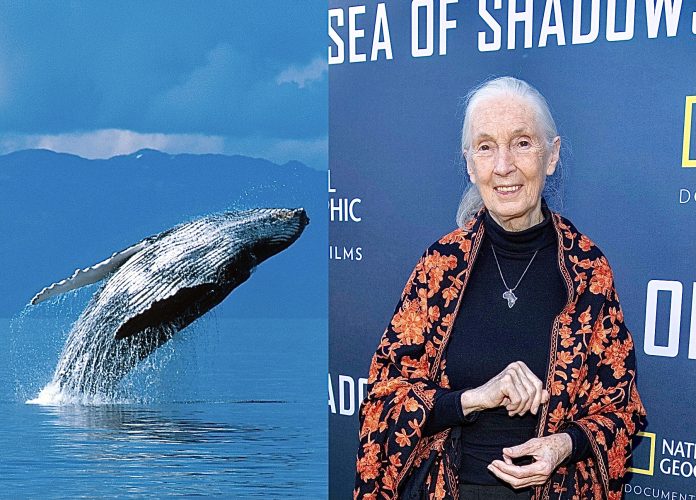Yesterday, Dr. Jane Goodall joined with many of the world’s leading animal protection and conservation organizations to urge the 88 member countries of the International Whaling Commission (IWC), to adopt a new 50-Year Vision to save whales, dolphins, and porpoises from extinction in the face of increasing ocean threats.
Many species are facing an increased threat of extinction due to fisheries bycatch; chemical, plastic, and noise pollution; marine debris; ship strikes; habitat loss; and the urgent climate crisis, as well as continued direct persecution from commercial whaling and dolphin drive hunts.
The coalition of NGOs, including the Animal Welfare Institute, Humane Society International, Born Free Foundation, OceanCare, IFAW, and Environmental Investigation Agency, launched the 50-Year Vision at a virtual event to mark the 75th anniversary of the IWC.
Originally established in 1946 to conserve whales in order to maximise hunting quotas, the IWC has since evolved to address a myriad of anthropogenic threats that pose an immediate danger for many populations of cetaceans. Of the 90 species, 12 subspecies, and 28 subpopulations of cetaceans that have been identified and assessed by the International Union for Conservation of Nature (IUCN), 22 are listed as critically endangered, 22 as endangered, and 16 as vulnerable. Without globally coordinated conservation actions, many species and populations will go extinct within our lifetimes, the NGOs warn.
“Some 80% of the world’s oxygen comes from the ocean. Our seas, along with our forests, are literally the lungs of our planet. Tragically, the vast marine habitat is increasingly threatened by our human actions,” said Goodall, while giving the keynote speech. “We are polluting it with toxic substances, large areas become acidified, the water is warming, commercial fishing has endangered many species, and its biggest and so loved residents—whales, dolphins and porpoises—are suffering.”
“Unbelievably, despite a 40-year ban, many still suffer the cruelty of commercial whaling. Then around 300,000 cetaceans die when they’re accidentally captured in fishing gear. They drown,” continued Goodall. “A number of species and some populations are now facing extinction. There are solutions, but our governments must prioritize them and also recognize and support the International Whaling Commission as the organization to coordinate these global priorities.”
The 50-Year Vision, supported by more than 50 NGOs worldwide, calls on the IWC and its member countries to act urgently to save cetacean species from decline. It warns that the degradation of the oceans has accelerated rapidly in recent years, with ocean temperatures warming up to 40% faster than the Intergovernmental Panel on Climate Change previously estimated. More than 150 million metric tons of plastics have accumulated in the oceans since the 1950s, and ocean acidification has increased by 26% since pre-industrial times. Global maritime traffic has vastly increased, as have ambient noise levels from shipping, seismic surveys, exploration, and military activities. These challenges are compounded by the loss of critical habitat to climate change.
A host of celebrities supported the 50-Year Vision at its launch event, with video messages from naturalist and campaigner Chris Packham, actress Dame Judi Dench, singer Leona Lewis, and world-renowned sailor Tracy Edwards.
The NGOs believe the IWC’s 75th anniversary provides the perfect opportunity ahead of its 68th meeting in October 2022 to define a clear 50-Year Vision that goes beyond managing whaling and establishes the IWC at the center of global efforts to conserve all cetaceans.
The 50-Year Vision asserts that, looking forward, the IWC’s priorities must be focused on conservation and recommends specifically that the IWC:
-
Maintain the ban on commercial whaling, which is not a viable industry in the 21st century. In the few nations that continue to conduct commercial whaling, demand for whale meat has fallen to unprecedented levels, and the industry is now dependent on significant government subsidies. The very nature of cetaceans—long-lived, slow breeding, depleted, and vulnerable to growing environmental threats—means that commercial whaling is inherently ill-suited to meeting sustainable development goals, such as providing food security and ensuring sustainable consumption and production patterns.
-
Manage aboriginal subsistence whaling. The IWC’s most important whaling management responsibility is the regulation of aboriginal subsistence whaling (ASW). It is vital that the IWC maintain a clear distinction between ASW and commercial and special permit whaling to ensure the integrity of the moratorium and meet the genuine nutritional, cultural, and subsistence needs of Indigenous peoples.
-
Ensure whale watching is effectively managed. Whale watching is an industry worth more than $2 billion, enjoyed by more than 13 million people in 119 countries each year. However, as the success of whale watching continues to grow, the IWC must ensure it is conducted responsibly and is biologically sustainable.
-
Implement IWC sanctuaries as effective marine protected areas. At a time (1979 and 1994) when marine reserves were a relatively new concept, the IWC took the visionary step of designating two massive protected areas. Today, there are more than 900 marine protected areas providing habitat for cetaceans globally, but not all have conservation goals or management plans to mitigate threats to cetaceans.
-
Consolidate the IWC’s welfare mandate. The IWC is uniquely positioned to ensure that the pain and suffering of cetaceans in both hunting and nonhunting situations is understood and minimized. It is already building a global response to entanglement, but must expand its work and its collaboration with other organizations to better understand, measure, and address other nonhunting welfare threats to cetaceans.
-
Increase collaboration, skill-sharing, and capacity building in member governments on ocean conservation, global biodiversity, sustainable development goals, harmonized research, and mitigation efforts to reverse the triple threat of climate change, pollution, and biodiversity loss.
-
Ensure that decision-making reflects that the ecological contributions of cetaceans are a public good. Cetaceans make vital ecological contributions to the health and productivity of our oceans. These include sequestering carbon, promoting biodiversity, and enhancing fish populations by increasing primary productivity. The IWC’s growing expertise in this area will enable it to leverage funding for cetacean conservation from new sources, including international institutions that fund climate mitigation and other conservation efforts.



